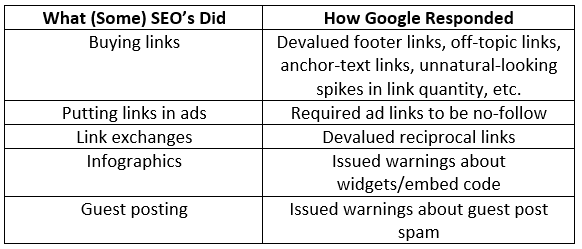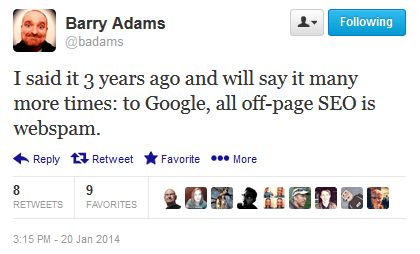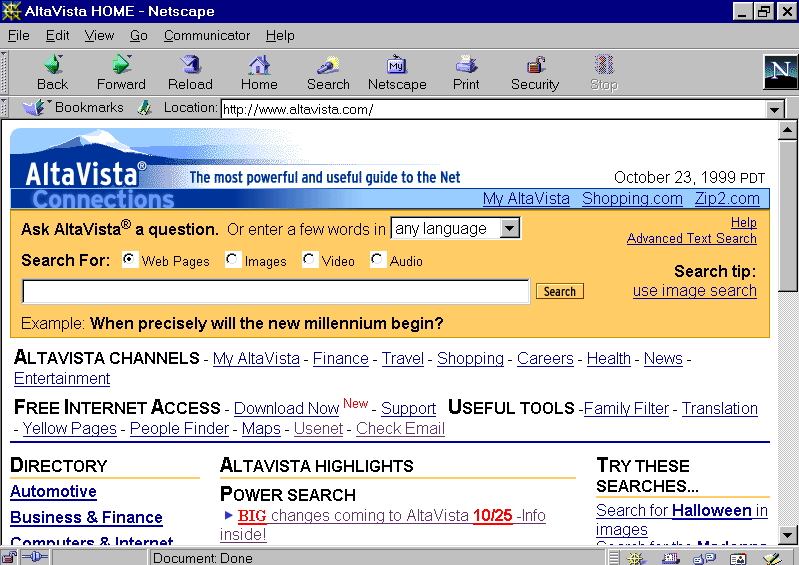
Whether they saw it coming or not, and whether they believe it or not, everyone in SEO sat up and noticed when Matt Cutts declared that guest blogging is dead. We’d all like to believe that we only guest-blog to share our knowledge, but the truth is, most of us have guest-blogged and gladly taken the links that came along with it. And the conversation has really been about links all week: Can guest-blogging survive without links? How do we get links if we don’t guest-blog anymore?
But aren’t we just treading water here? Guest blogging was just one tactic as part of a larger link-building strategy. Google is slowly chipping away at all our link-building tactics. Rather than replacing guest blogging with another kind of link building, maybe it’s time to think about a system that isn’t dependent on links.
We think we know what that system could be. Read on to see how we got there.
A Brief History of the Link for SEO
Some “duh” level SEO-basics background: Search engines used to run on keywords alone. It didn’t work well because keywords were too easy to manipulate. People stuffed their meta keywords field and hid keywords all over the page in the digital equivalent of invisible ink (white text on a white background).
Then Google came along and changed the game. They recognized the value of the hyperlink – a link was more than a pathway to another part of the Internet, it was a vote of confidence. Go ahead, a link says, leave my site and visit this other one, it’s worth it. So Google’s ranking algorithm was heavily dependent on incoming links, which were less manipulable.
You can see where this is going. The SEO industry grew right alongside Google’s rise to dominance, and while it’s harder to get links than it is to keyword-stuff your own pages, plenty of SEO’s discovered that you could still game the system and manipulate that “natural” ranking signal.
And here’s how that progressed:
The advice that SEO thought leaders and pundits (including us) typically give to websites and companies trying to get ranked is:
- Create great content that naturally earns links
- Don’t do anything with the sole intention of getting links, just add value to the world
This is all well and good for now. But it won’t work forever; it’s not sustainable. As people continue to find more creative ways to build links, Google will have to work harder to sort “good links” from “bad links.” And I predict that the next iteration of Google (or whatever search engine replaces it) won’t revolve around links – at the least, they’ll have a lot less weight in the algorithm as a ranking signal.
How Google Is Killing Its Own Value System
Google’s current logic around links and link building is full of holes and dead ends:
- Google is founded on the principle that off-page factors are more valuable than on-page factors. They are slowly learning that off-page factors can be manipulated too. But instead of looking for the Next Big Thing (the thing, like most links used to be, that is currently too hard to manipulate) they just keep tinkering with their old algorithm and scolding SEO’s. The latest scold was over guest blogging.
- Matt Cutts said this week that guest posting is OK … “if you’re not doing it for search engine optimization (SEO) purposes.” Let’s just stop and think about how silly this is. The implication is that it’s your motives that matter, not your actions. You can guest-post but only out of pure altruism. And Google will know you’re being altruistic because of the absence of links. But if publishers actually followed this advice, you’d have a bunch of “great content” getting created without any outgoing links. And without links, how is Google supposed to know what’s great?
- Cutts seems to think that people wants links as an end in themselves. He says you can guest-post for exposure and branding but not for links. But people want links for the exact same reason they’d want a bylined article in Forbes: Links are a form of exposure, both directly (through referral traffic) and indirectly, through SEO. And people don’t want high rankings as an end in themselves either, they want high rankings because high rankings give you exposure. Cutts concedes that it’s OK for marketers to do stuff for exposure, but for some reason links are no longer a valid form of that? That’s funny, since the whole idea behind Google is that links mean something.
- What if Cutts had said “Using keywords is OK if you’re not doing it for search engine optimization (SEO) purposes.” Or “Creating YouTube videos is OK if you’re not doing it for search engine optimization (SEO) purposes.” It would sound ridiculous. We know certain tactics are good for SEO, and Google can’t actually distinguish between a piece of content that just happens to be perfectly optimized versus one that was optimized on purpose. Google isn’t a Turing test and it can’t see into our souls. The purpose of the algorithm should be to rank the best content, not the content created with the purest of intentions and the least technical knowledge of SEO.
- As Barry Adams said on Twitter recently, Google has basically evolved to consider any off-page optimization as spam. But they’re drawing the line in a pretty arbitrary place. You can barrage people with your non-stop flow of content and hope people link to it, but you can’t outright ask for a link.
- There are more and more businesses and websites every day, but the first page of Google isn’t getting any bigger. Attention is scarce. The answer can’t simply be content (and I say this as someone whose job title includes the word “content”) because we’re already drowning in content. It should be possible for a business to exist without constantly churning out “content.” If the business offers something that people want or need, people should be able to use a well-made search engine to find that business, without having to indirectly happen upon their great content first. I’m dreaming of a simple website that does one thing well and doesn’t grow by one page size every day.
- It’s going to get harder and harder for Google to tell the difference between editorial links and manipulated links, in part because of all the noise (so. much. content.) and in part because it’s possible to create good, useful content “for SEO purposes.” A manipulated article and a non-manipulated article might look exactly the same. But Google seems to be flirting with the idea of devaluing both, just to be safe.
We can all keep trying to get links without calling it link building, but it’s looking more and more like Google’s breaking up with links.
So What Will Replace the Link?
To be honest, I didn’t know. But as often happens in crazy times like these, Larry and I were on the same page. We were both thinking about this question yesterday, and he thinks he’s got it figured out. In fact he said “I’m sure of it.” The answer? Quality Score.
Larry pointed out that Google needed links to get started. There were a bunch of different search engines at the time (Yahoo, Altavista, etc.) and less search traffic overall. They needed a way to map out the web and get a rough idea of the good and the bad. Fast-forward 15 years. Now that there are billions of searches a day, Google doesn’t really need links anymore. It can use the wisdom of crowds, an enormous source of data which doesn’t always involve links.
How Quality Score for Organic Search Might Work
Google puts tons of resources into its ad ranking algorithm. (Ads, of course, are the real moneymaker, but no one would click the ads if the search engine wasn’t useful on its own.) And how does it rank ads? Not just according to bids, because that would water down relevance. So Google came up with Quality Score, a way of treating ads like content.
AdWords Quality Score is largely based on click-through rate (CTR). There is a lot of Google fairy dust about how exactly it’s calculated, but our internal research indicates that it’s basically just the CTR of an ad at a given position in comparison to the expected click-through rate at that same position. As for stuff that hasn’t had a chance to get to the first page, Google can “audition” new ads and get a good sense for if they’re any good or not within just 200 impressions.
We think organic search could benefit from the same kind of algorithm – an algorithm that counts engagement metrics over links. These engagement metrics would include stuff like:
- Click-through rate
- Bounce rate
- Time on page
- Social shares
- Number of comments
- Etc.
Google could capture engagement metrics like bounce rate from Google Analytics, Google Chrome browsers (it’s the most used browser on mobile), and apps like Google+. Cutts just said that Google doesn’t use Facebook or Twitter social signals in its ranking algorithm, but many suspect part of the long game for Google+ is owning social data for ranking purposes.
Furthermore, Quality Score can scale. There are only 3 billion searches on Google per day, but it serves 5.6 billion search ads every day (not to mention the 24 billion plus display ads).
If you’re looking at it from the perspective of a marketer or a business, there are plenty of reasons why an organic Quality Score system might benefit you. Instead of constantly trying to create random kinds of content that might generate links, you could focus on (for example) optimizing your landing pages for conversion. A landing page designed for lead gen might work perfectly well and satisfy its visitors completely, but not get any links (who links to a landing page)? The overall emphasis is still on quality content, but the goal is different. You’re simply serving your users, many of whom may not have websites or the time and inclination to link.
“But what about click fraud!” you say. The fact is Google has already invested a lot into fighting click fraud – if they couldn’t detect or prevent it, their AdWords engine would be in trouble. So why couldn’t Google apply those same click fraud filters to determine which content is (naturally) getting the most clicks and subsequent engagement? (They have to fight spam on the paid side too; they removed 350 million bad ads in 2013 and rejected 3 million publishers.)
Is this a crazy idea? Not really – one search engine has already decided that links don’t matter. Russian-based Yandex uses user behavior and engagement instead of links. And Google is in a position to take the same approach and do it better, because they have way more data.
What do you think? Are we right? Is the era of the link coming to a close?









